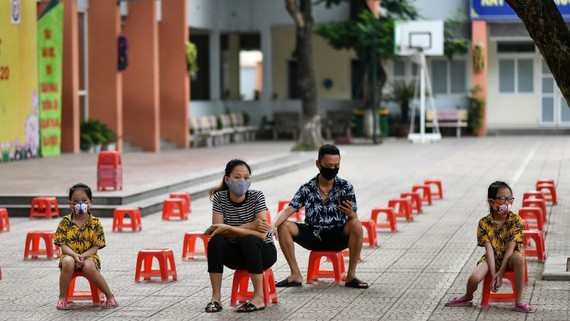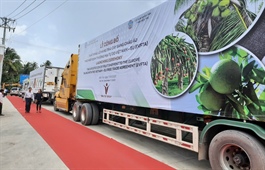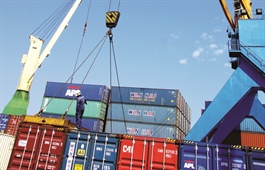Businesses under immense strain from pandemic
Businesses under immense strain from pandemic
The recent implementation by enterprises of the "3-On-Site" plan option has pushed up costs, although the fear of labor shortage during the ongoing pandemic has eased as well as the pressure of cash flow.
Illustrative photo.
|
Cost burden of plan
The foods and foodstuff industry which is important for the supply of most essential goods has made a strong effort to implement the "3-On-Site" plan option. However, according to an assessment by Mrs. Ly Kim Chi, Chairman of Foods and Foodstuff Association of Ho Chi Minh City, the implementation of "3-On-Site" plan option is only a temporary measure for a short period of time, and may only last from two to three weeks for medium enterprises, and four to five weeks for the larger enterprises, because the enterprises are having to bear too high expenses to ensure the production chain runs smoothly by implementing strict regulations on disease control at factories.
Costs have risen greatly for weekly testing, equipping workers with right gear, and providing board and lodging on site. Costs for all these amenities has risen by 50% to 100%, and the cost of extra wages for workers to stay at the factory have also increased by 30% to 50%. Although these provisions to workers has kept the production chain running, the total cost of enterprises has increased many times compared to before, while the total output has decreased by more than 50%.
According to Ms. Chi, at this time, it is not just the high cost of implementing the “3-On-Site” plan that is weighing heavy on the food processing enterprises, but they also have to hold on to their business despite no profits, as input costs are too high. Under the present scenario, the price of input materials for the industry, from domestic to imported, have increased sharply by 15% to 30%, while the purchasing power of the market has weakened considerably, as enterprises have to maintain same selling price as before, in an effort also to share the current difficulties with consumers.
Mr. Nguyen Chanh Phuong, Vice Chairman of the Ho Chi Minh City Handicraft and Woodwork Association, said that currently, about 60% of enterprises in the association are carrying out "3-On-Site" plan, and there are even businesses that have implemented this option since the end of June to maintain the goal of keeping a competitive position for the Vietnamese wood industry, because otherwise orders in subsequent years may be shipped out to other countries.
However, Mr. Phuong also assessed that when implementing this plan there are many difficulties for businesses, one of which is increased costs. The cost of carrying out Covid-19 testing for all workers in the factory alone is not a small number. Once every seven days, an average person’s cost is VND 350,000.
Shortage of workers
Much before the Covid-19 pandemic broke out in Ho Chi Minh City, enterprises in labor intensive industries such as textiles, garments, leather, and footwear were facing situations when many orders had to be cancelled due to lack of workers. Currently, with the pandemic continuing to rage unabated, this worry is becoming even more enhanced. In the garment industry in Ho Chi Minh City alone, only about 30% of enterprises can carry out "3-On-Site" production plan. In addition, when implementing this option, only 50% of workers can participate due to various personal reasons.
Not only the garment industry but many other industries are in the same situation. There are also further difficulties as a large part of workers have chosen the option of returning to their hometowns to fight the pandemic. Among the workers who have returned to their hometowns, there will also be a large percentage that will not want to come back at all to work again in factories. This will cause many businesses to face the challenge of a serious shortage of workers when the pandemic is finally brought under control and businesses return to normal operations once again.
In a recent meeting with businesses, Mr. Vo Van Hoan, Vice Chairman of the People's Committee of Ho Chi Minh City, said that the City is currently implementing a number of social policies to support workers in enterprises to ensure the rights and interests of employees, and ensure that labor supply continues even when the pandemic is under control. Mr. Hoan said that the participation of business leaders is needed now.
Firstly, in supporting employees to stop working or suspend the performance of labor contracts for a certain period of time, it is necessary to have a list from enterprises for according the right policies to enjoy. Secondly, for workers who do not sign a contract or have a contract but is not eligible for unemployment insurance, the City expects businesses to have a list for the local government to implement support policies.
Bank support imperative
Mr. Pham Van Viet, General Director of Viet Thang Jean, hopes that the banks can freeze the investment in fixed assets until the end of the pandemic period. If possible, even extend the payment period for one year to support raw materials coast and take care of workers, to restore production. He also said that last year, the bank supported the restructuring and rescheduling, but after the debt rescheduling, the bank issued very strict regulations, and if the interest rate was delayed even for a day, it would change the debt group. This needs to be removed now because the pandemic is making it extremely difficult for businesses to operate.
In fact, not only Viet Thang Jean, but most businesses expect banks to give timely support at this time because cash flow is stuck. Mr. Nguyen Ngoc Hoa, Vice Chairman of Ho Chi Minh City Business Association, and Chairman of the Board of Members of the State Finance Company, said that in a recent meeting, enterprises raised many expectations, including two contents that were agreed on.
Firstly, businesses want the City to direct and work with the banks to freeze debts, delay debts, and review interest rate policies, because during the period of social distancing, some businesses have some loan principals and interest payment terms. Therefore, it is necessary to have a policy to support businesses and when we finish the social distancing period, the time will be discounted for.
Secondly, I would like to request the tax authorities to reconsider policies, because according to tax regulations, and by the current deadline, it is necessary to pay corporate income tax of the second quarter. If possible, it should be extended to the time when social distancing has ended, so as to reduce cash flow pressure on businesses. If businesses are late in payments during the pandemic period, it is requested that the State not penalize enterprises, but help create more support for businesses in current difficult times.
























